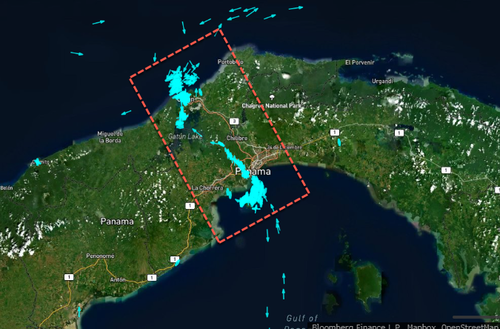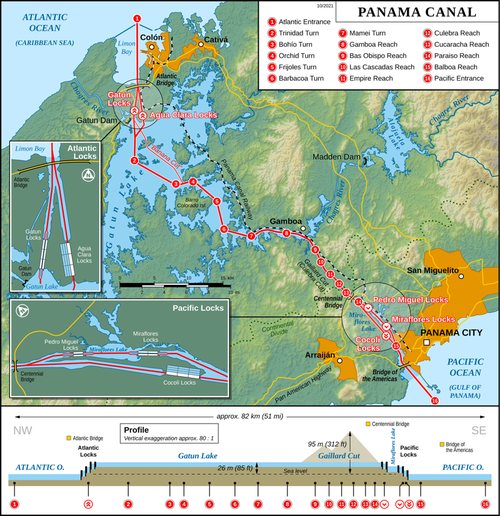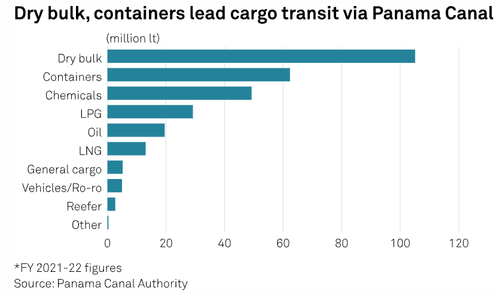Steve Bull's Blog, page 92
November 13, 2023
White (Hydrogen) Lies
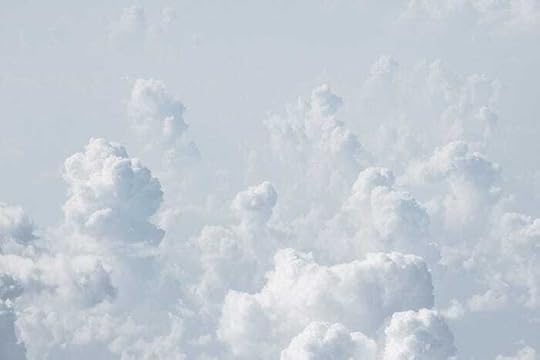 Photo by Carlos Torres on Unsplash
Photo by Carlos Torres on UnsplashGeologists, while searching for oil and gas in France, have found the biggest deposit of pure naturally occurring hydrogen yet. A source of fuel which “burns clean” and hot, and thus can “replace” fossil fuels in “hard to decarbonize” areas of the industry like steel, glass or cement manufacturing, not to mention the fact that it could be directly used to make fertilizers (ammonia) from. Heck, it might be even more abundant elsewhere than it was previously thought. “Yippee, modern civilization is saved! Or not…?”
The myth of a hydrogen economy is a tough creature to slay. It has grown multiple heads over the decades, and as you cut one off, three or four new heads pop up to replace it. Since each head has a different color it certainly looks like that we will run out of the color gamut sooner than ideas on how hydrogen could “save” modernity. First, there was Grey hydrogen which, by the way, is still the most economically viable and thus the most widespread source of this fuel. Ironically it’s demise in its role as the savior of modern civilization came from the climate movement itself, since it is made directly from methane (natural gas). “Its foul mouth reeks with CO2 and methane! Down with it.”
Good riddance. With the same sword swing the Brown/Black head started to roll as well: as it is also made with fossil fuels directly (via coal gasification). Two heads with one swing! Not bad, isn’t it? The faith that modern civilization cannot perish and must go on no matter what, however, has gave birth to a plethora of new heads. It started to look clear decades ago already that electrification alone will not be able to save modernity, especially when it comes to high heat applications or long distance transport. Somebody had to come up with something.
…click on the above link to read the rest…
Today’s Contemplation: Collapse Cometh CLXII–Reality is an Inconvenience to Beliefs
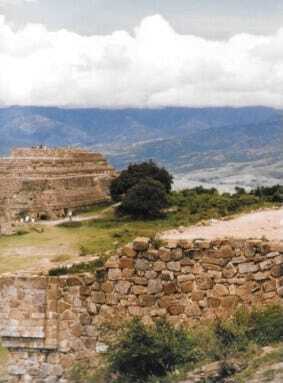 Mexico (1988). Photo by author.
Mexico (1988). Photo by author.Reality is an Inconvenience to Beliefs
Today’s brief Contemplation was prompted by The Honest Sorcerer’s latest article that looks at the latest energy ‘breakthrough’ (seems there is one every other week) and how it’s going to save modern civilisation, our species, and the planet.
In this globalised world where virtually every economic transaction has become finacialised, and one cannot for long survive without some type of revenue stream (because we have lost the skills/knowledge to live apart from our complex and monetised energy-averaging systems), it seems to me that everything has become a racket — in terms of a fraudulent scheme.
And ‘energy’, being the most fundamental of ‘resources’ for life, has been fully captured by the multitude of racketeers — as has all the revenue-generating/-extracting aspects of our sociocultural existence.
War. Politics. Food. Health. Education. Resources. You name it.
These are all being leveraged by our society’s ruling caste, grifters, and wannabes to generate revenue. And attracting investment capital with some technological/innovative ‘breakthrough’ works because of our ongoing (if very misguided, primarily due to recency bias) belief that human ingenuity and technological prowess can solve all ‘problems’ — predicaments without ‘solutions’ don’t exist.
As I more deeply explore the story-telling nature of our species and the psychological mechanisms at play during this communication process, it is becoming clear that it matters little — if at all — that the narrative being shared aligns with physical reality or not. We believe what we want to believe and all it takes is that the tale we are being told needs to be ‘plausible’, provide us with a sense of agency (especially self-efficacy), reinforces our self-esteem, reduces our cognitive dissonance, is believed by many in our social circle, and is being told by a ‘trusted/authoritative’ source.
Dave Pollard, who writes here, has put forward a ‘Law of Human Beliefs’ (see his latest here) that is quite relevant to this observation:
“Pollard’s Law of Human Beliefs: We believe what we want to believe, not what is actually true. We want to believe in happy endings, simple answers, the inevitability of progress, self-control, karma, responsibility, destiny, miracles, a proper order of things, the power of love, and infinite human capacity and agency. Most of us want to believe in a higher power that can step in when we falter. We want to believe what those in our circles of trust believe (even if it’s crazy, gaslighting or propaganda). So we tend to seek sources that reinforce those beliefs and ignore those that undermine or unsettle them. Our hopes and expectations are determined by those beliefs. Our worldview is the sum of those beliefs, hopes and expectations, and bears no necessary resemblance to truth or reality. This invented reality is the only way we can make sense of a world that is impossible to grasp, to understand, or to ever really make sense of.”
Our denial of reality is strong and often, if not always, cannot be overcome. We go to all sorts of lengths to rationalise and justify our belief systems, regardless of evidence/facts that challenge them.
And as Ajit Varki has postulated in his and Danny Brower’s theory on the origins of the human mind,
“The human ability to understand and consider our own mortality without being consumed by fear seems natural to us. In fact, it appears to be just one manifestation of a peculiar human ability to ignore, rationalize, or outright deny obvious realities, and even to believe in multiple or alternate realities at the same time…
Even when we do acknowledge such realities, we tend to indulge in magical thinking, behaving as if these statistics apply to everyone else, but not to ourselves. Many humans also ignore or even deny scientific and societal realities such as biological evolution, anthropogenic climate change, human “overshoot” with nonrenewable resource depletion, gross degradation of our environment, massive expansion of national debt, ballooning healthcare costs, covert or overt racism, and so on.”
(See Rob Mielcarski’s site, un-Denial, for a lot more on this subject.)
Biogeophysical limits — meh, it’s not reality; it’s just another conspiracy theory by those tinfoil hat-wearing ecofascists. Please disregard all that ‘collapse/overshoot’ nonsense and carry on with your consumption and dreams of perpetual growth on a finite planet…oh, and please send us any investment money while you’re at it (and/or encourage your government to) so we can solve those predicaments the nutcases keep yammering on about.
November 12, 2023
The Polycrisis
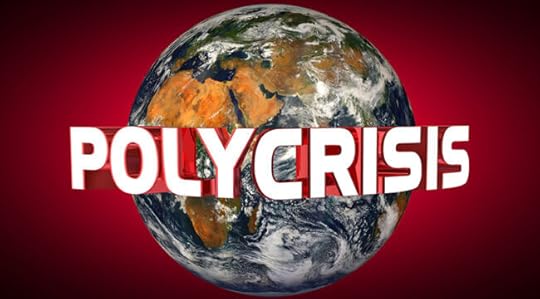 The Polycrisis
The PolycrisisBack in 2017 when I composed this graphic of overlapping crises, the word polycrisis was not yet in common use. Polycrisis has various definitions, for example: “the simultaneous occurrence of several catastrophic events.”

But this doesn’t explain the truly dangerous dynamic in polycrisis, which is the nonlinear, mutually reinforcing potential of disparate crises to generate effects much larger than the initial causes. This definition is closer to the mark: “Many different problems happening at the same time so that they together have a very big effect.”
Put another way: 1 + 1 + 1 doesn’t generate an effect of 3, it generates an effect of 9.
You’ll notice the crises on my graphic are internal socioeconomic dynamics: state-cartel centralization, demographics, soaring debts, Imperial overreach, technological disruption, disunity in elites and diminishing returns on financial predation.
Many don’t see these as crises; they’re seen as factors, not as potentially catastrophic dynamics. This is the linear analysis: None of these dynamics is actually threatening to the stability of the U.S.
The nonlinear analysis is: Considering each one as a discrete dynamic, that’s true. But these are mutually reinforcing crises because the status quo “solutions” to each one become mutually reinforcing problems which generate much larger effects than most believe possible.
Note that external factors such as war and climate change are not shown. These conditions are not entirely controllable by U.S. policy decisions. They affect the entire world, not just one nation-state. That said, external crises add additional nonlinear influences to the polycrisis.
Polycrisis and Supply and Demand
The human mind is not particularly well-adapted to polycrisis: We struggle to adapt to the drought, then the earthquake knocks down the village walls, then the tsunami pounds what was left, followed by the epic flooding, then the hurricane batters the survivors, who witness the volcano erupting and wonder what they did to anger the gods and goddesses so mightily.
…click on the above link to read the rest…
The Entanglement Hypothesis Revisited

image adapted from Pixabay, CC0
“I think human consciousness is a tragic misstep in evolution. We became too self-aware, nature created an aspect of nature separate from itself, we are creatures that should not exist by natural law. We are things that labor under the illusion of having a self; an accretion of sensory experience and feeling, programmed with total assurance that we are each somebody, when in fact everybody is nobody. Maybe the honorable thing for our species to do is deny our programming, stop reproducing, walk hand in hand into extinction, one last midnight – brothers and sisters opting out of a raw deal.” — Rust Cohle – character in the TV series True Detective
Three years ago, I added a third ‘law’ to the small set of ‘important things I’ve learned over the years’ and codified on this blog. The three laws are:
Pollard’s Law of Human Behaviour: Humans have evolved to do what’s personally urgent for them (the unavoidable imperatives of the moment), then to do what’s easy, and then to do what’s fun. There is never time left for things that are seen as merely important. Social, political and economic change happens only when the old generation dies and a new generation with different entrained beliefs and imperatives fills the power vacuum. We have evolved to be a collaborative and caring species, and we are all doing our best — we cannot do otherwise. We have no free will — our behaviour is entirely the product of our biological and cultural conditioning, given the ever-changing and unpredictable circumstances of each moment.
…click on the above link to read the rest…
The Globalist Vision: “15 Minute” Prison Cities And The End Of Private Property
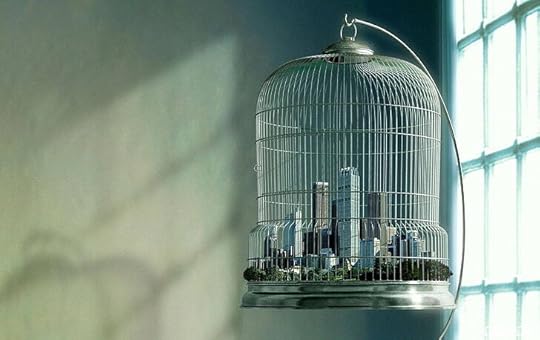
As a general rule I find that whenever the public scrutinizes any particular agenda being promoted by governments and globalists their first response is to act indignant, much like a narcissist would do when they are up to no good and they get caught. “How dare you” question their intentions and suggest they might be nefarious. How dare you suggest they are anything other than loving and benevolent. Our “leaders” have only ever wanted the best for us, right? They only want our lives to become safer, more comfortable and more convenient – This is what truly motivates your average elitist, right?
Obviously history tells us a far different story, and it boggles my mind when anyone tries to argue that things are different today compared to 100 years ago, 300 years ago, or 1000 years ago. There is nothing new under the sun. There will always be tyrants attempting to gain more and more power and those tyrants will always lie to the public, claiming they are good people with our best interests at heart.
When that doesn’t work and the citizenry remains skeptical, the tyrants go on the attack, accusing the public of “conspiracy theory.” This is meant to mock and shame free thinkers into silence – You don’t want to stand out, right? Why risk being ostracized from society? Why risk becoming a meme?
This tactic is rooted in the notion that the corporate media and government officials represent the mainstream, and therefore they represent the majority, and the majority represents reality. None of this is true or relevant, of course. Only facts matter. Sophistry is meaningless. Opinions are meaningless. The truth should be the goal, and if it’s not someone’s goal then they must be a purveyor of lies and should not be taken seriously. There are only two paths to take, there is no in-between.
…click on the above link to read the rest…
Today’s Contemplation: Collapse Cometh CII–That Uncertain Road, Part 1.
February 20, 2023
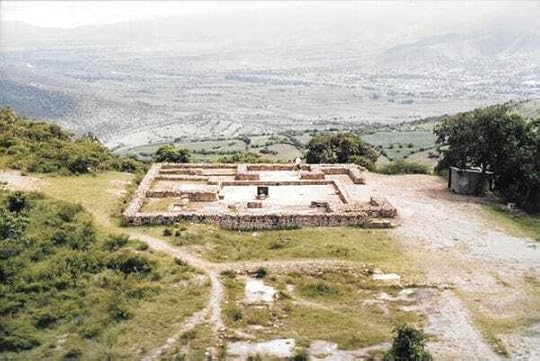 Monte Alban, Mexico. (1988) Photo by author.
Monte Alban, Mexico. (1988) Photo by author.That Uncertain Road, Part 1
“I think it’s much more interesting to live not knowing than to have answers which might be wrong. I have approximate answers and possible beliefs and different degrees of uncertainty about different things, but I am not absolutely sure of anything and there are many things I don’t know anything about, such as whether it means anything to ask why we’re here. I don’t have to know an answer. I don’t feel frightened not knowing things, by being lost in a mysterious universe without any purpose, which is the way it really is as far as I can tell.”
― Richard P. Feynman
“As far as the laws of mathematics refer to reality, they are not certain; and as far as they are certain, they do not refer to reality.”
― Albert Einstein
There are many words that could be used to describe the future and humanity’s ability to know how it will unfold. Unknowable. Unpredictable. Uncertain. Unwritten. Undetermined. Unforeseeable.
These tool-making, story-telling apes we have termed homo sapiens just happen to abhor this aspect of existence. Uncertainty has been found to result in negative affect for most people in most situations[1]. In fact, it has been suggested that “the oldest and strongest emotion of mankind is fear, and the oldest and strongest kind of fear is fear of the unknown”[2] and that “…fear of the unknown may be a, or possibly the, fundamental fear, representing an Archimedean lever for human psychology”[3].
As Dan Gardner reminds the reader in Future Babble[4] humans want and need control, especially of their environment/surroundings. Not having control, or at least the sense of it, can lead to stress, disease, and early death. Having some ‘certainty’ about what the future holds is a type of control, even if we know what happens is out of our personal control.
We have developed a host of psychological mechanisms to defend against our fear of uncertainty (e.g., illusion of control). In fact, psychologists have found an increased dependence upon magical thinking when control is lost or uncertainty increases[5]. In addition, people will cling more fiercely to their belief system in the face of counterfactual evidence in order to increase their sense of certainty. They will ignore or deny those things that increase their cognitive dissonance and the uncertainty it creates.
We also more often tend to see patterns where none exist as we search for certainty[6]. Reassurance about the future motivates people to seek it somewhere. Anywhere.
Cognitive psychologists suggest prospection, the term used to describe the generation of possible future scenarios, is a central tenet of both cognition and emotion[7]. But it is also a fundamental aspect of learning for any animal that is driven by their avoidance of pain and seeking of pleasure since being able to sense patterns of environmental changes or actions of other animals can alter their behaviour to seek a reward or avoid a punishment — perhaps the most basic one being falling prey to a potential predator.
As tool makers, we leverage this rather unique ability in attempts to help us control our environment, thus providing a sense of security against this uncertain future. And it seems we often fall back on this skill to help us believe some as-yet-to-be-hatched ‘tool’ will be created to help us achieve what we have yet to achieve — certainty about the future by solving our various problems, such as a lack of ‘clean’ energy.
As story tellers, we craft all variety of narratives to help us understand our world — the past, the present, and especially the future. Religion. Biology. Politics. Physics. Economics. History. Mathematics. Psychology. Astrology. Ecology. Chemistry. Philosophy.
Are any of the tales we tell and share accurate reflections of our world and its functioning? Can we predict the future? Can we, using all of our cognitive abilities, understandings of the world, and technologies reduce the uncertainty that lays before us?
The answer may actually be irrelevant since we all tend to believe what we believe — be it learned or conditioned, accurate or misinformed. And we use what we believe to reduce our anxiety about an uncertain future.
Despite all of the above, and knowing full well that predictions about the future are just stories we tell to reduce our uncertainty, the following is one perspective on what the future may hold based upon two beliefs that seem certain to me, although I know they don’t to everyone:
1) We exist upon a planet with finite resources;
2) Biological and historical precedents exist from which we can learn and help us map a likely future.
First, we live upon a planet with a finite amount of resources available to us. Despite the story that infinite substitutability can overcome or mitigate this reality, I firmly believe we cannot create more of our most important resources from thin air. This is especially true for life’s primary resource, energy. As the First Law of thermodynamics states: energy can neither be created nor destroyed, only converted from one form to another. This limits what is available to all species upon our planet.
Second, there exist biological and historical ‘experiments’ concerning ecological overshoot and complex society ‘collapse’ that we can use to help us understand important processes and how they are likely to unfold.
To paraphrase the saying about events rhyming with the past, there should be no assumptions that the future will unfold exactly as it has in the past. While there will no doubt be similarities because humans are animals with strong genetic predispositions that act and react in somewhat constrained ways, we are also a species with strong sociocultural influences upon our behaviour that vary in both time and place. And the contextual environment within which we are behaving is never precisely the same; particularly given the complexities that accumulate and impact us — especially technological in nature.
There is so much that has already been written and could be said about ecological overshoot and humanity’s prospects as we travel further into it. It is important to my thinking here that I note that humans are a biological species similar to every other one on our planet and there exist many behavioural responses that we cannot avoid because of this. Perhaps the most fundamental biologically-based one is that of reproduction and a species tendency to reproduce to a level that can be sustained by their immediate habitat. Overshooting this sustainable carrying capacity invariably results in moving to an uninhabited and unexploited area or ‘reversion to the mean’ of a species’ population size[8].
Humans however, as an apex predator and with their tool-making abilities, have been able to exceed significantly the natural, environmental carrying capacity allowing us to go well beyond the limits imposed by nature. Population biology demonstrates that such a situation cannot and will not go on indefinitely. And the resulting ‘correction’ may as a result of this being even more dramatic in nature.
As William Catton Jr. argues, our ability to employ technological tools to expand our carrying capacity has resulted in a trap that now threatens the environment and ecological systems we require for our survival. Blind to what we are doing, we have embraced and increased the speed with which we are drawing down the finite resources we rely upon. There will be, based upon other species that have overshot their environmental carrying capacity, a reversion to the mean of population size that can be ‘sustained’ — and it will be much, much lower than may have been reached in an uncontaminated and undamaged environment[9].
Further, Catton observes that “[o]vershoot will occur, if it hasn’t already. We may come to feel guilty about stealing from the future, but we will continue to do it. Overshoot will further aggravate the reduction of carrying capacity. Crash must follow. The greater the overshoot, the greater the crash.” (p. 253)
The following graph from Catton’s text provides four possible growth scenarios, with Panel D being the most likely for humanity. As he explains “’carrying capacity’ has been represented by two different curves. A major fraction of the recent, apparently high carrying capacity for human high-energy living must be attributed to temporary resources — i.e., non-renewable fossil acreage, the earth’s savings deposits. In Panel D, it is optimistically assumed that the component of carrying capacity based on renewable resources has remained stable so far. But it is recognized that serious overshoot, induced by temporarily high composite carrying capacity, will at least temporarily undermine even the sustainable component.” (p. 253)
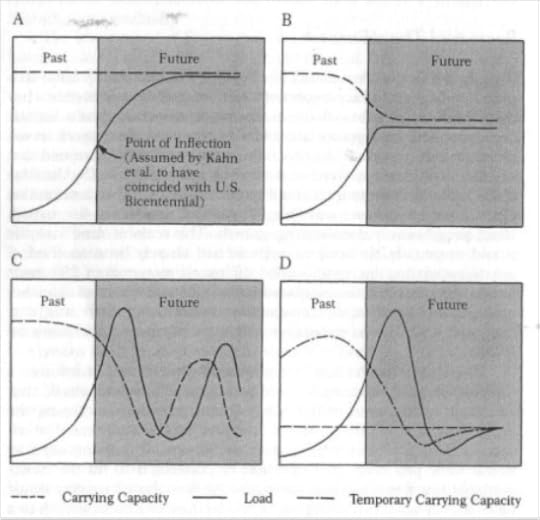
That’s overshoot in a nutshell: an epic crash in population as our fundamental resources can no longer support our numbers. The writing seems on the wall that human population numbers are likely to fall precipitously from their current and relatively high numbers.
How that unfolds is yet to be determined, but it seems the most likely scenario some time down the road as the resources, especially energy, become more scarce to support our inflated numbers…
In Part 2, I will elaborate on what I believe our pre/historical precedents suggest about what we might expect down that uncertain road…
[1] See this, this, and/or this.
[5] See this, this, and/or this.
[6] See this, this, this, and/or this.
November 8, 2023
Snarled Supply Chain? Drought Prompts U-Turn Of Two Gas Tankers At Panama Canal
The El Niño weather pattern has sparked a drought this year across Central America that is creating extreme congestion at the Panama Canal, prompting some ships to turn around and seek alternative routes.
New shipping data from Bloomberg shows two liquefied petroleum gas (LPG) carriers, Pyxis Pioneer and Sunny Bright, recently turned around within 10 miles (16 kilometers) of the canal before sailing away.
Both vessels have a capacity of 158,000 cubic meters of LPG and were en route to major LPG facilities in the US Gulf. Their current destination, however, remains to be determined.
The canal relies on rainwater from Gatun Lake, a nearby artificial reservoir, to feed the lock system. The lack of rainfall this year because of El Nino has led canal authorities to impose draft and sailing restrictions.
One week ago, the Panama Canal Authority (PCA) said October was “the driest since the earliest registers, 73 years ago” and “caused by the El Nino phenomenon continues to impact the Panama Canal’s reservoir system and, as a result, water availability has been reduced.”
PCA has reduced the number of booking slots for vessels to transit the canal from 31 to 25 this month and will be reduced by nearly 30% to 18 by Feb. 1, 2024. In comparison, the maximum number of sustainable bookings is between 38-40 per day.
The most common vessels transiting the crucial waterway are dry bulk, containers, chemicals, and LPG vessels.
While the major supply chain disruptions from the pandemic have declined, new challenges are arising due to the low water levels at the Panama Canal, causing fresh supply chain issues.
November 6, 2023
Today’s Contemplation: Collapse Cometh CLXI–A Self-Sufficient Community — Better Than Precious Metals or Fiat/Digital Currencies
 Mexico (1988). Photo by author.
Mexico (1988). Photo by author.A Self-Sufficient Community — Better Than Precious Metals or Fiat/Digital Currencies
Today I’m sharing a conversation with others via the Comments section for a post on the website Zerohedge — as well as a preamble to the conversation to set the context for my part in the conversation. The article is focused upon the future of fiat currency but comes via the website Schiffgold that for all intents and purposes markets precious metals, warning of the perils of fiat currency.
For anyone who follows such sites, you will be cognizant of the ongoing debates regarding precious metals and fiat/electronic currencies. Essentially, the disagreements are founded upon differences of opinion regarding the best avenue for storing one’s ‘wealth’, particularly surplus wealth, to help avoid the inevitable collapse of current fiat currencies.
I have written a bit about such topics, particularly as they pertain to growth and collapse, in these posts:
Feeding the Growth Monster: Fiat Currency and Technology Blog Medium
Fiat Currency: Debasement and Infinite Growth Blog Medium
Fiat Currency, Infinite Growth, Finite Resources: A Recipe For Collapse Blog Medium
Greenwashing, Fiat Currency, Narrative Management: More On Climate Change and Elite Confabs Medium
Ruling Caste Responses To Societal Breakdown/Collapse Medium
When I first fell down the rabbit’s hole that is Peak Oil and began to explore all the issues related to this most fundamental of predicaments for our societal complexities, storing surplus wealth was a concern for me[1]. My wife and I were still both working full-time in relatively secure and well-paying careers (we’re both since retired), our house was paid off, and our two children were still in high school. We had always been relatively frugal in our consumption and were privileged enough to be in a situation where our income almost always exceeded our expenditures — early in our marriage, when we were both still students, was the exception. But, once we paid off our mortgage (which we did as expediently as possible after our student loans were paid off, that carried 14+% interest on them when we graduated) we were spending far less than we were earning.
As I dug deeper into the complexities of energy and its implications for our globe, I worried more and more about the future and how to best insulate my family from what may come. I was drawn towards precious metals given my educational background in archaeology and the presence of it as a means of exchange throughout recorded history. But as I delved deeper and deeper into the cyclical recurrence of societal ‘collapse’ it became clear that without local self-sufficiency/-resiliency having a hoard of precious metals (many of which have been found by archaeologists, and thus unused/abandoned) or an electronic wallet holding digital currency was probably moot and not a secure means of ‘preserving wealth’.
I have come to understand/believe that community resiliency and a focus on our fundamental needs may be the most appropriate response to the coming storm that is a loss of surplus energy and the consequential breakdown of energy-averaging systems (i.e., long-distance trade). This is why I now suggest that relocalising food production, potable water procurement, and regional shelter needs may be one’s best approach to help insulate one’s community and thus family.
I have spent the better part of a decade exploring and practising how to produce as much food as possible on our relatively small, suburban piece of land north of Toronto and initiated a food gardening guild in my community. These are by no means a ‘solution’ to our predicaments and I could currently feed our household of five adults for about two weeks on our garden harvest — if we’re lucky. I take solace, however, in the fact that each year the gardens produce a bit more and my ongoing experiments meet with success more often than failure (from which I try to learn from).
My fledgling attempts are far, far behind others I communicate with or read about online, but I am far, far ahead of almost my entire social circle. Apart from my blood siblings, none are pursuing any form of self-sufficiency but are hip-deep in ignorance, denial, and bargaining — carrying on with their ‘modern’, relatively affluent lifestyles.
My much younger sister (who has put her career as a gynaecological oncologist on hold as she is home with three young children) has been experimenting with food production and chicken raising the past couple of years. And my younger brother — who is months away from retiring as a fire station captain — has recently purchased a remote property (relative to the densely populated southern Ontario where he and I reside) in northern Ontario where I spent a week this summer helping him get some neglected raised beds cleaned up — there were surprisingly a plethora of well-established perennial food plants present.
Anyways, without further ado, here is the conversation that reflects some different perspectives…
Me: While precious metals or crypto may be a store of wealth as argued by many, I think I’d sooner ‘invest’ what little surplus I have in physical tools/supplies to help my family/community become more self-sufficient and resilient. As the saying goes, you can’t eat gold. Physical materials that will help in food production, procurement of potable water, and regional shelter needs may be a much better focus for folks than either fiat, electronic wallets, or metals at this point in the fourth turning…oh, and a means to protect what you have may be wise as well — from community cohesiveness to armaments of some kind.
Weirdly: Saving money is for excess value. You have it right. Tools, businesses, friends, community until you are limited, then save in bitcoin.
Me: I think I’d sooner save excess in silver/gold than bitcoin. Chances are high that grid-down scenarios are likely to increase in frequency and size as the center loses control making electronic-based ‘wealth’ about as useful as our politicians…but as price inflation is quickly eating away any excess for me, this may be a moot point.
JudgeSmails984: Grid down scenarios? Are you high? I live in Northern California where they shut the power off when it’s windy and ask you not to charge your EVs in the summer when everybody is using their AC, and still, the power never goes out for more than a few hours, anywhere.
your “increasing frequency of grid down occurrences” statement is idiotic and not based on real world reliability data. Outside of natural disasters and yahoos shooting up transformers here and there, the electrical grid is a highly distributed architecture of critical infrastructure, and there are almost no significant outages, anywhere that matters in the US.
Also-almost all critical facilities like hospitals and law enforcement all have backup diesel generators-our electrical system is very robust and resilient.
how so many people plan their investments around something that never happens, has never happened but might happen, is beyond me. It’s like taking a parka into the desert at noon because it might snow while you are there…it could happen, the next ice age could begin today.
JudgeSmails984: I have a 3 month instability limit. You shut the lights off and leave the humans without food to fend for themselves, I have one bullet for myself in that unlikely scenario.
Given that my current GF is diabetic, she’d probably check out a month after the CVS stores ran outta insulin.
I have freeze dried food, some gold, silver, cash to get through a short period of disorder, but I have no interest in living rough, like indefinitely, for years without security, food, comfort etc. through a new, post apocalyptic dark age.
I’ve had 50 good years, rather go out with a bang than suffer slowly and watch those I love perish.
Good luck with your long term ambitions though. Hope nobody you love gets a tooth abscess or bacterial infection…once cured at the clinic on the corner, now likely fatal.
Me: Living ‘rough’ is completely subjective in nature and our species has done so for many, many millennia in the past; and by all accounts (despite the misconceptions of many due to a focus upon what befell the ruling elite upon previous societal collapses) lived fulfilling lives.
Yes, some of our complex conveniences will be absent but a lot of what befalls a complex society during its ‘collapse’ will actually be an improvement for many; that’s why and how collapses happen, it’s an economic/political choice by people who abandon the systems imposed by the ruling caste of a society for what they perceive as an improved situation — read archaeologist Joseph Tainter’s The Collapse of Complex Societies.
If your local community is self-sufficient and can get through the initial chaos of faltering/declining complexities, there’s no reason a ‘dark age’ cannot be avoided.
HardKnoxKid: Totally agree…… My yard is full of estate sale tools….. lots of hoes, shovels, metal rods, rolls of electrical wire….. great buys at some of these sales……. one day, all those nice electronics folks have will not do them poop….. watched a 30 year old black woman in my country meat market….. had 3 kids under 10…. she walked in right before me…. got out of an old Corolla, but clean….. kids very well mannered. She was looking at the meat, and telling the kids maybe they would have beef for dinner…. and picked up a couple packages of stew beef…… As I shopped, I saw her being very wise. After I paid for my small cart, I found her adding up her few items….. I gave her a $50……. told her to buy steak or whatever she wanted….. she was very reserved and cried lightly…… I could tell that “she” had a rough upbringing….. and if I could help her just for an evening, then that is my pleasure…… And yet, we send trillions over seas for all the crooks………Don’t have any vehicle or mortgage or credit card payments….. don’t give to big charities…… this is my way of giving…… It feels good.
Surreality: That’s good in the community. I think do both. We and our communities also need to preserve our wealth as well as have resources to be resilient.
A handful of interesting articles to ponder:
The Energy Crisis is Here to Stay
Debt, Currency Debasement & War — The Timeless Pillars of Failure
The System Isn’t Designed to Help You
The Cycle of Evil
Today’s Energy Bottleneck May Bring Down Major Governments
Why Civilization Would Collapse Even Without Climate Change
Climate Disaster Is Here — and the State Will Never Save Us
Bonus:
50 Books About the Collapse of Civilization
If you’ve made it to the end of this contemplation and have got something out of my writing, please consider ordering the trilogy of my ‘fictional’ novel series, Olduvai (PDF files; only $9.99 Canadian), via my website or the link below — the ‘profits’ of which help me to keep my internet presence alive and first book available in print (and is available via various online retailers).
Attempting a new payment system as I am contemplating shutting down my site in the future (given the ever-increasing costs to keep it running).
If you are interested in purchasing any of the 3 books individually or the trilogy, please try the link below indicating which book(s) you are purchasing.
Costs (Canadian dollars):
Book 1: $2.99
Book 2: $3.89
Book 3: $3.89
Trilogy: $9.99
Feel free to throw in a ‘tip’ on top of the base cost if you wish; perhaps by paying in U.S. dollars instead of Canadian. Every few cents/dollars helps…
https://paypal.me/olduvaitrilogy?country.x=CA&locale.x=en_US
If you do not hear from me within 48 hours or you are having trouble with the system, please email me: olduvaitrilogy@gmail.com.
You can also find a variety of resources, particularly my summary notes for a handful of texts, especially Catton’s Overshoot and Tainter’s Collapse: see here.
November 4, 2023
Today’s Contemplation: CLX–Solace Will Not Be Found Within Our Sociopolitical Systems — Biogeophysical Limitations Cannot Be Overcome By Way Of Policy
 Mexico (1988). Photo by author.
Mexico (1988). Photo by author.Solace Will Not Be Found Within Our Sociopolitical Systems — Biogeophysical Limitations Cannot Be Overcome By Way Of Policy
The following Contemplation is composed of some thoughts I had as I read through and reflected upon an article that was posted on the website Zerohedge. It argues that the policies being pursued by our political systems to address climate change are likely to result in greater human suffering and what is needed is better policy by governments.
While there are some pertinent points made (such as highlighting the abuses imposed upon some local populations where resources for non-renewable, renewable energy-harvesting technologies are being extracted from), my very first thought when I finished the article was “Why, that’s so cute that you still believe we live in a ‘democracy’ that ‘serves’ the citizens it purports to and is responsive to and cares about those citizens.”
This, however, is the default believe system for a very significant portion of a nation’s population and particularly those of the West that claim to live in ‘representative democracies’. It is one of the overarching narratives that people are exposed to from a very young age and it’s hard for any to see behind the curtain that has been erected by our socialisation/enculturation and the massive propaganda that is a part of that. The denial/bargaining/rationalising others engage in when this particular core belief is challenged is breathtaking to behold at times. Very, very few wish to view critically the notion that our political systems are ‘representative’ or ‘responsive’. They accept it as a given and do not wish their illusions to be destroyed lest cognitive dissonance overwhelm them.
I have written numerous times about this and won’t dwell on these points except to share links to a handful of those Contemplations:
Collapse Cometh X (Who Do ‘Representative’ Governments Truly Represent)
Collapse Cometh CXII (Our Banking System: Government vs. Private Control, Part 1)
Collapse Cometh CXIX (Local Community Resiliency and Political Systems)
Collapse Cometh CXXX (Only Local Leadership Can Help Communities Now)
Collapse Cometh CXXXVII (Local Self-Resilience Is Imperative to Pursue In Light Of Ecological Overshoot)
In addition, just as problematic (perhaps more so) in the rhetoric of the authors is their blindness to the limitations of what is being proposed and the bargaining and magical thinking that this entails. Yes, the policies being pursued by our governments are going to increase human suffering; but ultimately not in the way that the authors believe — they are going to exacerbate our ecological overshoot predicament and cause Nature’s reversion to the mean all the more chaotic and widespread.
While the sociopaths in our world leverage each and every worry/risk (e.g., climate change/global warming, war, economy, the ‘other’, etc.) to meet their primary goal of control/expansion of the wealth-generation/-extraction systems that provide their revenue streams and thus power/influence/prestige, such analyses as presented here are as guilty of leveraging magical thinking to argue for something as profoundly misguided: the continuation of perpetual growth/progress on a finite planet through improved political policies. For example, they suggest implementing ‘responsible mining’ and ‘domestic production of complex technologies’ to avoid human suffering.
Such an approach appears blind to the energy/resource limits on a planet with biogeophysical constraints, and what can/cannot be accomplished with respect to ongoing growth and ‘progress’. Exponential growth of any species beyond the natural carrying capacity of its environment always leads to ecological overshoot and eventually collapse of the population. And there is ample evidence that humans are well into overshoot and have been for some time eating our seed corn (and creating self-congratulatory narratives) to avoid this truth.
Homo sapiens are no different from any other species in this regard. Except that we have a ruling caste that is leveraging the various symptom predicaments of overshoot (via ‘solutions’ to predicaments that have none, or to justify/rationalise invasion and occupation of resource-rich lands) in order to keep padding their offshore bank accounts and control their respective populations; and all the while they are helping to expedite the collapse of our complex societies and ecological systems in the process — mostly by drawing down finite resources to keep the mythos of perpetual growth/progress alive just a bit longer.
Yes, the vast majority of ‘solutions’ being marketed to address ‘climate change’ are mostly (if not totally) rackets being perpetrated upon society (e.g., ‘green/clean’ energy production, carbon capture and storage, Net Zero, electrification of everything) and the threats of our overarching predicament of overshoot (i.e., biodiversity loss, ocean acidification, atmospheric overloading, chemical pollutants, etc.) are getting lost in the kerfuffle — mostly through denial and bargaining.
And, yes, as diminishing returns on our investments continues to pick up speed with our exponential drawing down of resources, it is likely that the threat of ‘climate change’ or ‘war’ will be used to rationalise the need for massive ‘austerity’ (except of course for the ‘privileged’ minority) as our ruling caste attempts to protect and insulate themselves.
In fact, there’s a good argument that this approach has actually been occurring for a century+ and reality has simply been ‘papered over’ through massive currency devaluation and debt (hundreds of trillions of interest-bearing debt to date), and the increase of resource theft from regions outside the centre and not already overexploited (especially of hydrocarbons, the lifeblood of our societal complexities — there’s a reason the Middle East has been a quagmire for decades and the dominant nation coming out of World War 2 created the Petrodollar System).
But as William Yeats reminded us in The Second Coming: “Things fall apart; the center cannot hold”. The fall/decline of complex societies is a recurrent theme in human pre/history regardless of the policies of the ruling caste and the best technologies of the time. Diminishing returns on investments in complexity along with the predicament of ecological overshoot is resulting in this cyclical phenomenon shifting from regional collapse to being global in nature.
How this proceeds exactly this time around is anyone’s guess, but the process cannot be avoided…and without recognising the actual predicament of overshoot and its inevitable consequences our approaches to what is unfolding will continue to be misguided and simply make Nature’s correction all the more devastating.
And our political systems and ruling caste members are likely the very last place we should be looking for guidance on all of this given their primary motivation/goal requires doing the exact opposite of what our species needs to be pursuing: rapid and significant degrowth.
The Future for Fiat
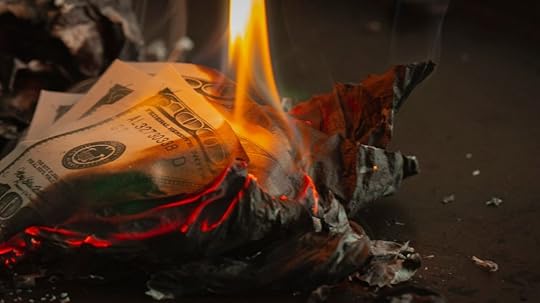
The day of reckoning for unproductive credit is in sight.
With G7 national finances spiraling out of control, debt traps are being sprung on all of them, with the sole exception of Germany.
Malinvestments of the last fifty years are being exposed by the rise in interest rates, increases which are driven by a combination of declining faith in the value of major currencies and contracting bank credit. The rise in interest rates is becoming unstoppable.
Do not be surprised to see a US Government deficit exceeding $3 trillion this fiscal year, half of which will be interest payments. And in the run-up to a presidential election, there’s every sign of deficit spending increasing even further.
We now face America and her allies being dragged into another expensive conflict in the Middle East, likely to drive oil and natural gas prices higher; far higher if Iran becomes a target. With the Muslim world united against Western imperialism more than ever before, do not discount the closure of Hormuz, and even Suez, with unimaginable consequences for energy prices.
The era of interest rate suppression is over. G7 central banks are all deeply in negative equity, in other words technically bankrupt, a situation which can only be addressed by issuing yet more unproductive credit. These are the institutions tasked with ensuring the integrity of the entire system of bank credit.
This is not a good background for a dollar-based global credit system that is staring into the black hole of its own extinction.
The end for the dollar is nigh
There are a number of events coming together that suggest we are about to undergo a major upheaval in world economic, financial, and monetary affairs…
…click on the above link to read the rest…

